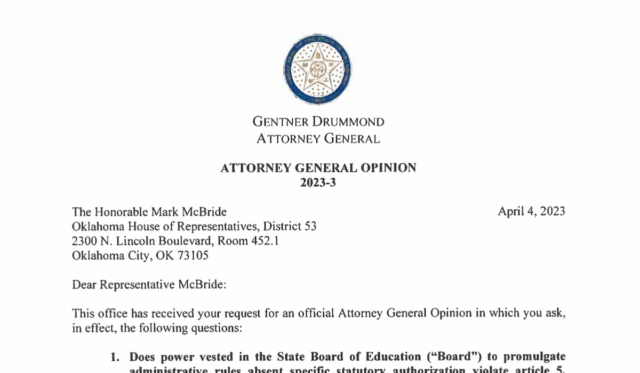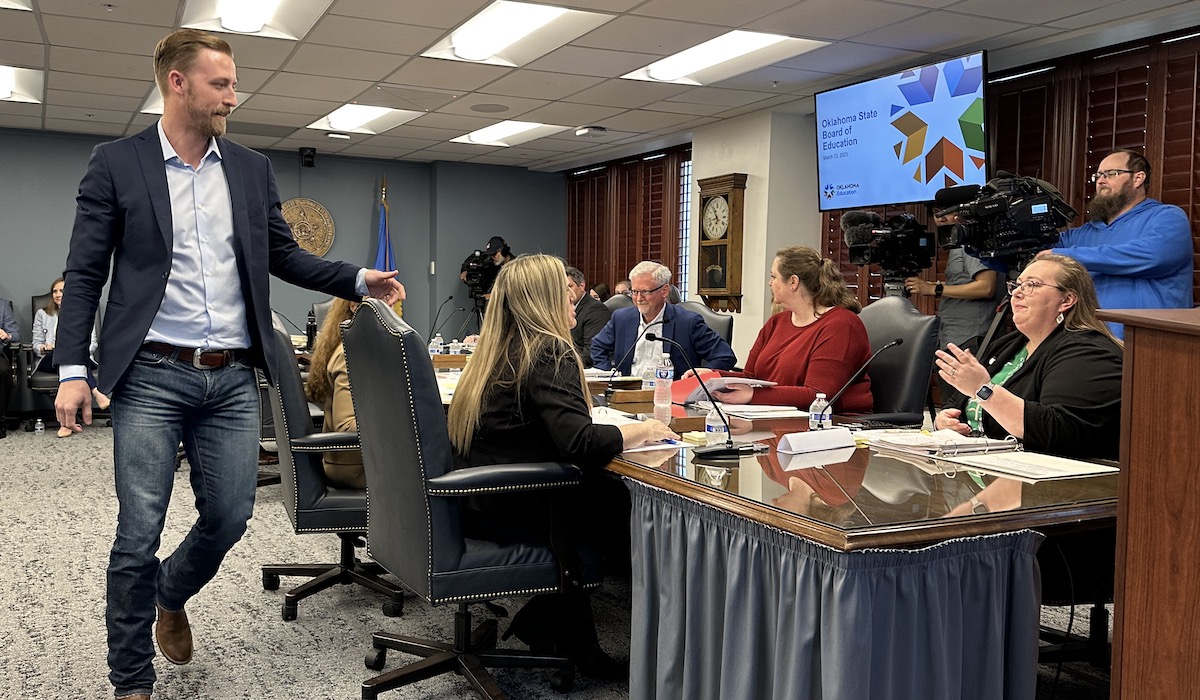
(Correction: This article was updated at 1:35 on Tuesday, June 6, 2023, to remove incorrect explanations of opt-out provisions for sex education in schools. Oklahoma statute requires schools to allow parents to opt out of sex education for their students if they so choose, and the rules approved by the board at the March 23, 2023, meeting do not change that provision.)
Oklahoma Attorney General Gentner Drummond issued an opinion today that the State Department of Education can only promulgate administrative rules in situations where they are instructed or authorized to do so by the Legislature. Functionally, the opinion means accreditation rules approved March 23 by the State Board of Education concerning library books, sex education and student gender and sexual identities are “invalid and may not be enforced.”
“Whether I agree or disagree with any particular rule in question is irrelevant if the board does not have the proper authority to issue those rules,” Drummond said in a press release. “The Legislature is vested with policymaking authority. I will not allow any state agency, board or commission to usurp the Legislature’s rightful role, even if they have the best of intentions.”
Rep. Mark McBride (R-Moore), who originally requested Drummond’s analysis, said he was “pleased” with the AG opinion, which is embedded below.
“It’s what we thought all along, that agencies do not have that kind of rule-making ability without legislative approval,” McBride said.
McBride echoed Drummond’s sentiment but said that if OSDE wants to create those rules, it should “go through the proper channels like everybody else does.”
“It’s not that I disagree with the position that (Superintendent of Public Instruction) Ryan Walters has, it’s just that the process he used isn’t the way to go about it,” McBride said.
Rep. Dick Lowe (R-Amber) also praised the AG opinion.
“It is great to have clarity on this matter from the attorney general,” Lowe said. “We strive to follow the laws of Oklahoma in all areas. The legislative body looks forward to working with all agencies in serving our citizens through the proper pathways afforded by statute.”
Board members unanimously approved 11 new administrative rules at their meeting March 23. Three days prior, on March 20, Drummond’s general counsel had sent a non-binding opinion in response to McBride’s request. The non-binding letter previewed the opinion ultimately issued by Drummond about three weeks later.
According to the official opinion released today, which is binding until the interpretation is challenged in court, the OSDE’s rules were not created at the direction of laws passed by the Legislature, so the board had no authority to approve them.
At the March 23 state board meeting, OSDE general counsel Bryan Cleveland said staffers in the Attorney General’s Office had discussed the March 20 letter with his department. Cleveland said Drummond’s office clarified to him that “the letter should not be understood as a comment on today’s rules.”
After the meeting, Walters repeated Cleveland’s comments.
“We’ve had great conversations with the Attorney General’s Office,” Walters said March 23. “We haven’t seen any issues in the rules we’ve currently proposed or have been working on. We see no issues and have a great relationship. (…) We haven’t seen anything from them.”
But the new AG opinion makes clear Drummond’s interpretation of the agency’s powers.
“Any rule promulgated relying only on the general ‘powers and duties’ (…) is invalid and may not be enforced by the State Department of Education or the board,” Drummond wrote.
‘Board must identify a specific grant of authority’

Two of the 11 accreditation rules proposed by OSDE and approved by the state board on March 23 touched on Walters’ frequent campaign promises. Walters touted the rule concerning libraries as one that would get sexually explicit materials out of schools.
After defining terms such as “pornographic” and “sexualized,” the rule would have required districts to provide the OSDE with lists of books available to students each year, and it would have prohibited school libraries from providing “pornographic materials or sexualized content” to students. If schools willfully failed to comply with the rule, the district’s accreditation could have been downgraded.
The second rule dealt with the so-called “Parents Bill of Rights.”
The rule would have required schools to notify parents of “any information known to the school district or its employees regarding material changes reasonably expected to be important to parent(s) regarding their child’s health, social, or psychological development, including identity information.”
Many who opposed Walters’ rules argued that such requirements would force schools to notify parents of students’ sexual or gender orientation before they were ready.
During the March 23 meeting, Cleveland primarily cited Article 13, Section 5 of the Oklahoma Constitution and Title 70, Section 3-104 of state statute as evidence that the board has authority to create the rules.
Article 13, Section 5 declares, “The supervision of instruction in the public schools shall be vested in a Board of Education, whose powers and duties shall be prescribed by law.”
Cleveland argued that materials in school libraries fall under the board’s “supervision.”
Title 70, Section 3-104 of state statute describes the powers and responsibilities of the board pursuant to the state’s constitution.
Specifically, it gives the board the power to “adopt policies and make rules for the operation of the public school system of the state.”
“Because of those two broad sources, the board’s authority — both constitutional and statutory — the board does not need any more statutes (…) in order to pass these rules,” Cleveland said.
But Drummond disagreed.
Calling that section of Oklahoma statutes “likely infirm,” Drummond said in his opinion that the power of creating new rules lies only with the Legislature.
“While the board has general rulemaking authority under section 3-104, this provision standing alone does not confer the authority to make rules on any specific statutes or subject matter,” Drummond wrote. “Rather, the board must identify a specific grant of authority from the Legislature, which is more precise than the board’s general powers and duties in section 3-104. Otherwise, the board would invade the constitutionally granted purview of the Legislature.”
Walters’ spokesperson provided some media with a comment from Walters.
“Unfortunately, I disagree with the Attorney General’s opinion,” Walters said. “We must keep pornographic material out of schools.”
View the full attorney general opinion
